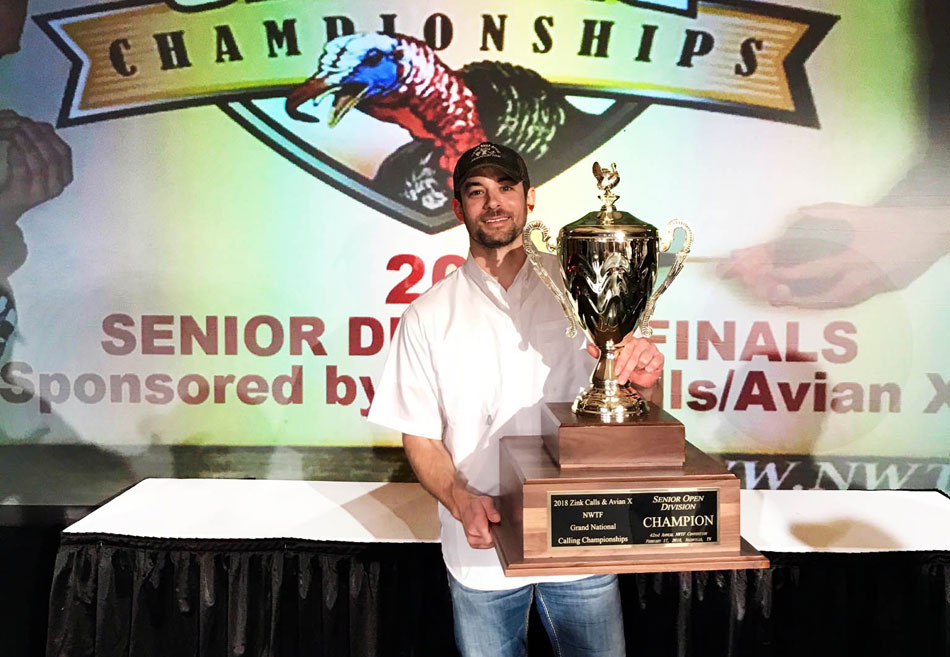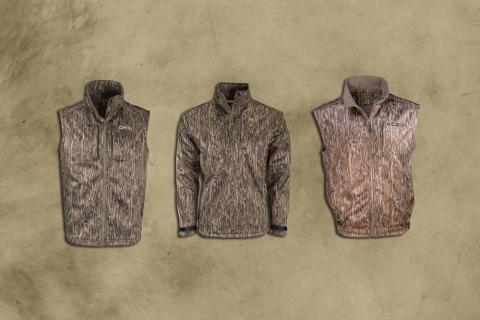David Owens from Acworth, Georgia, is the 2018 National Wild Turkey Federation (NWTF) Grand National Senior Open Division turkey-calling champion. In 2017, he completed an almost unbelievable feat by completing the U.S. Super Slam of wild turkeys, taking 49 gobblers in the 49 states with 90 percent of those birds harvested on public lands. Owens started hunting turkeys when he was 13 and has been hunting them for 20 years. He’s only been entering turkey-calling contests for six years. A Mossy Oak ProStaffer for four years, Owens prefers wearing Mossy Oak Bottomland for his early-season hunting and Mossy Oak Obsession for hunting late-season turkeys.

Dave Owens | Mossy Oak ProStaff
To win the Grand National Senior Division Open Turkey Calling Contest, you have to qualify for it through your local, regional and national turkey-calling contests. In 2018, 45 contestants had qualified in the Senior Division to call in the World Grand National. Next, the contestants compete and the field is cut to the top 12 callers. Then the past champions of the Grand National and the World Turkey Calling championships from previous years who are attending the NWTF convention are added to the field of contestants. The contest is to try and select the best-of-the-best turkey callers for that year.
My success as a competitive turkey caller comes from my passion for calling turkeys, and my obsession in being able to get close to wild turkeys. I believe my ability to observe and interpret the language of the wild turkey is a strong suit for me. I also believe that my turkey-calling skills are a by-product of not only hunting turkeys for a long time, but hunting turkeys all over the nation for a good portion of my life.
I've been close to a lot of turkeys. I've tried to be a consummate student of the birds, and I've listened intently and attempted to replicate the sounds that the wild turkey makes. I've also tried to understand why turkeys make the sounds they make when they make them. Then I've taken that information I’ve learned to attempt to replicate those sounds in a way that’s recognizable by the judges.
When I'm hunting turkeys, I use the same mouth diaphragm calls out in the field that I use in competition. But I also carry friction calls like a pot call with a couple of different strikers. I’ll also take a wingbone call and a tube call with me.
One interesting twist to the Grand National Contest was that the judges gave the competitors a turkey-calling situation and asked the contestants to use the calls in the sequence they would use in a hunting situation. They gave us two different scenarios to act out.
1) The first scenario was a hen waking up on the roost, flying down into a field and then beginning to feed. For this scenario, I gave some tree calls and bubble clucks for my early-in-the-morning calls, followed by a little more aggressive yelping and a fly-down cackle. When the hen hit the ground, I gave some plain yelps and then some hen yelps like a hen seeking company from a gobbler. Then I finished off my series with some clucks and purrs, some feeding whistles and whines and some little sounds like the hens make when they're bugging in a meadow.
2) The second scenario was a fall flock of turkeys that were scattered, reassembled and then two jakes began to fight. For this scenario, I started with a couple of jakes walking past the judges giving kee kee run calls. I was trying to imitate the sounds that young gobblers make when they start thinking about reassembling with the flock. Then I gave an adult hen assembly call like a hen trying to regather her flock that had been scattered. I followed that call by more intensive kee kee calling like young gobblers that had heard the hen’s assembly call and were calling back to her to let her know that they were coming. I followed those calls with a lost jake call like he was trying to locate and get back with the flock. Then I gave the sound of one jake that got too close to another jake, and they began to fight with some fighting purrs along with some whistles and whines. I only used diaphragm calls to give the calls that I used for each scenario.
I felt like I had done the best I could do, but I really thought that Josh Grossenbacher had a really good chance of winning when he gave his calls, because he was able to call later in the competition, which is usually an advantage, and he gave some fantastic calls. So, I really thought that Josh would win the championship.
When the announcer called my name out as the winner, I was dumbfounded. I more or less wondered around on the stage, not knowing what to do or what to think. When I was announced as the champion, I was shocked. I was very humbled to be mentioned in conversations with the great past champions of this contests and the great callers who competed in the Grand Nationals. Many of these callers had competed in this calling contest for many years, and it was a huge honor for my name to be mentioned with that same group of guys like Matt Van Cise, Billy Yargus, Jesse Martin and the other great Mossy Oak ProStaff calling compeitiors.



























